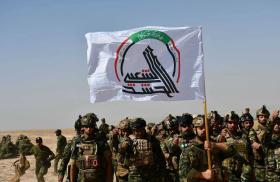
OFAC Designates Iraqi Militiamen (Part 2): KSS and Abu Ala al-Walai

Part of a series: Militia Spotlight
or see Part 1: How to Use Militia Spotlight
Kataib Sayyid al-Shuhada's designation for terrorist activities is long overdue, reflecting its important ongoing role in attacks on U.S. forces in northern Iraq and eastern Syria.
On November 17, the U.S. Treasury Department's Office of Foreign Assets Control (OFAC) sanctioned seven individuals associated with the Iran-backed militias Kataib Hezbollah (KH) and Kataib Sayyid al-Shuhada (KSS), and designated KSS as a whole, presumably including its unit within the Popular Mobilization Forces (PMF), the state-funded 14th PMF Brigade. The first part of this analysis covered the KH designations; this part will look at KSS.
KSS Recognized for Its Efforts to Kill Americans
OFAC added KSS to its Specially Designated National (SDN) list under Executive Order 13224, which pertains to "blocking property and prohibiting transactions with persons who commit, threaten to commit, or support terrorism." The Treasury statement underlined that KSS receives support from Iran's Islamic Revolutionary Guard Corps (IRGC) and "has planned and been involved in attacks against U.S. personnel in Iraq and Syria.” According to Militia Spotlight's attack tracker, as many as twenty-one drone and long-range rocket attacks appear to have targeted U.S. forces from assessed KSS launch areas between October 17 and November 17.
KSS is a useful addition to the list of Iraqi-led terrorist groups that play official roles in the Iraqi state, which include KH, Asaib Ahl al-Haq (AAH), and Harakat Hezbollah al-Nujaba (HaN). As with those three designated groups, KSS also operates a Popular Mobilization Force (PMF) brigade (the 14th) that is paid and provisioned by the government, further underlining the state's role in providing material support to U.S.-designated terrorist entities.
Abu Ala Personally Designated
In addition to designating KSS as an organization, OFAC also named its leader, Abu Ala al-Walai (aka Hashim Finyan Rahim al-Siraji or Hashim Banyan al-Siraji), as an SDN for terrorist activities under EO 13224. This places him on the same level as other SDNs from Iraqi terrorist groups, including Qais al-Khazali and Laith al-Khazali of AAH, Akram Kaabi of HaN, and Abu Hussein of KH. This fills a curious gap that has existed for a long time—while KSS founder Abu Mustafa al-Sheibani (Mustafa Abdul Hamid Hussein al-Utabi, Hamid Thajil al-Utabi) has been designated by the United States since 2008, the group's current leadership was not.
Abu Ala has run KSS since 2014, taking over from Sheibani when the latter became an advisor to Iraqi Interior Minister Mohammed al-Ghabban, a Badr Organization official. Abu Ala had previously been incarcerated by the United States for militant actions as a KH member; he was released in 2010. In other words, he should be categorized (like Sheibani) as a former KH member who split from the militia's Abu Hussein and Abu Fadak wings to form KSS during Syria's civil war. Abu Ala was also one of the first muqawama (resistance) commanders to report to current IRGC-Qods Force chief Esmail Qaani after Qasem Soleimani and Abu Mahdi al-Muhandis were killed in a January 2020 U.S. strike. Indeed, Abu Ala is an often-overlooked but key part of the IRGC-QF proxy network in Iraq and Syria.
Much like his old boss Abu Mustafa, however, Abu Ala seems prone to making mistakes and being let down by his family. His son Jaafar was censured in 2022 and lost control over the militia outlet Sabereen News after ordering followers to burn down the Kurdistan Democratic Party offices in Baghdad. And Abu Ala himself was embarrassed in 2019 when one of his rocket warehouses in south Baghdad overheated and sent Katyushas across the skies of Baghdad, making militia-governed Iraq look like a dysfunctional mess.






